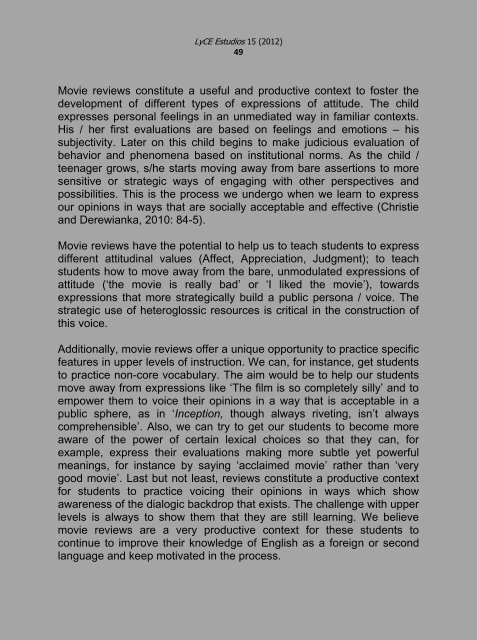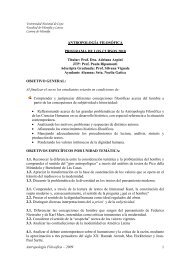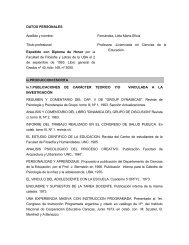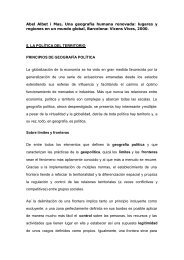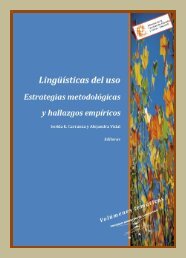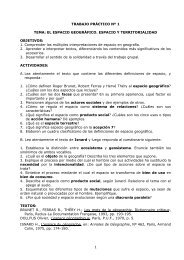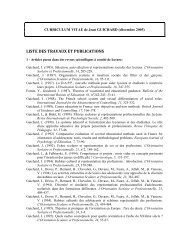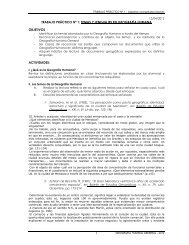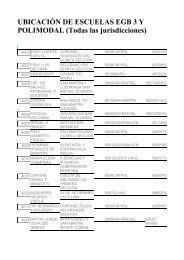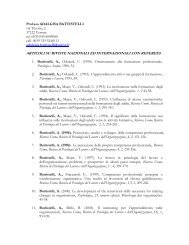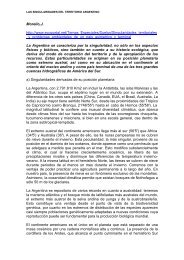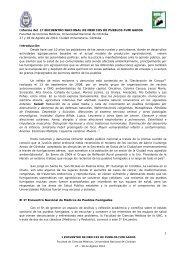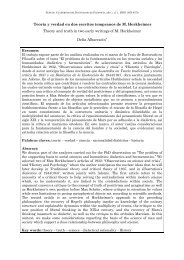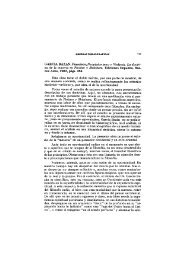LyCE Estudios - Facultad de Filosofía y Letras - Universidad ...
LyCE Estudios - Facultad de Filosofía y Letras - Universidad ...
LyCE Estudios - Facultad de Filosofía y Letras - Universidad ...
You also want an ePaper? Increase the reach of your titles
YUMPU automatically turns print PDFs into web optimized ePapers that Google loves.
<strong>LyCE</strong> <strong>Estudios</strong> 15 (2012)<br />
49<br />
Movie reviews constitute a useful and productive context to foster the<br />
<strong>de</strong>velopment of different types of expressions of attitu<strong>de</strong>. The child<br />
expresses personal feelings in an unmediated way in familiar contexts.<br />
His / her first evaluations are based on feelings and emotions – his<br />
subjectivity. Later on this child begins to make judicious evaluation of<br />
behavior and phenomena based on institutional norms. As the child /<br />
teenager grows, s/he starts moving away from bare assertions to more<br />
sensitive or strategic ways of engaging with other perspectives and<br />
possibilities. This is the process we un<strong>de</strong>rgo when we learn to express<br />
our opinions in ways that are socially acceptable and effective (Christie<br />
and Derewianka, 2010: 84-5).<br />
Movie reviews have the potential to help us to teach stu<strong>de</strong>nts to express<br />
different attitudinal values (Affect, Appreciation, Judgment); to teach<br />
stu<strong>de</strong>nts how to move away from the bare, unmodulated expressions of<br />
attitu<strong>de</strong> (‘the movie is really bad’ or ‘I liked the movie’), towards<br />
expressions that more strategically build a public persona / voice. The<br />
strategic use of heteroglossic resources is critical in the construction of<br />
this voice.<br />
Additionally, movie reviews offer a unique opportunity to practice specific<br />
features in upper levels of instruction. We can, for instance, get stu<strong>de</strong>nts<br />
to practice non-core vocabulary. The aim would be to help our stu<strong>de</strong>nts<br />
move away from expressions like ‘The film is so completely silly’ and to<br />
empower them to voice their opinions in a way that is acceptable in a<br />
public sphere, as in ‘Inception, though always riveting, isn’t always<br />
comprehensible’. Also, we can try to get our stu<strong>de</strong>nts to become more<br />
aware of the power of certain lexical choices so that they can, for<br />
example, express their evaluations making more subtle yet powerful<br />
meanings, for instance by saying ‘acclaimed movie’ rather than ‘very<br />
good movie’. Last but not least, reviews constitute a productive context<br />
for stu<strong>de</strong>nts to practice voicing their opinions in ways which show<br />
awareness of the dialogic backdrop that exists. The challenge with upper<br />
levels is always to show them that they are still learning. We believe<br />
movie reviews are a very productive context for these stu<strong>de</strong>nts to<br />
continue to improve their knowledge of English as a foreign or second<br />
language and keep motivated in the process.


